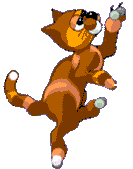
 |
Computer PetzDogs, Catz, and Oddballs Page |

Catz is similar and Oddballs are wacky pets that spontaineously mutate into one-of-a-kind characters.
They had a great website, which even had a kennel you could visit to learn more and to visit with other dogz owners.
Below are some articles about the Computer Petz line.


The Washington Post
4 August 1996
FINAL Page B01
by Peter Finn
(Copyright 1996)
Eventually, Reisler turns around, grabs a ball and throws it for Spunky to fetch. Too late. Spunky is in a huff and skulks off to a corner, where he lies down with an annoyed sigh, his head turned away.
"Sorry, Spunky," says Reisler, 46, of Falls Church, who pets the dog. Spunky relents and begins to prance. Now, of course, Kosh is barking for attention, flashing those big eyes and whining.
All on computer.
The digitalization of life has come to this: virtual pets.
Spunky and Kosh are cartoon canines with some artificial intelligence whose kennel is the computer. Reisler keeps Spunky in his home computer and Kosh in his laptop. Once clicked out of their playpens, the two scamper across the top of computer applications.
Blessed with a programmed ability to remember, the dogs learn behaviors as their owners, using the computer's mouse, interact with them: Give the dog a particular treat when he performs a particular trick, and pretty soon the dog will perform that trick when you show him the treat. But some behaviors are selected randomly from the dogs' pro-g ramming, giving them a certain unpredictability. And that combination of learned and random actions gives these pets their individual identities.
PF.Magic, a San Francisco company, has sold 100,000 "Dogz" in the United States since it launched the pet last November, and sales are also booming worldwide. A cat program was created this summer. Each computer pet costs about $20.
"Dogz are thinking, responsive, emotional creatures," said Rob Fulop, PF.Magic's co-founder and creative director. "You can finally develop a real relationship with a living creature on your computer."
All of which is fascinating in a purely technological sense. Just as fascinating, perhaps more so, is the virtual pet owner.
Listen to Randi Miller, 35, of Alexandria, who keeps her bulldog at work. "Jake is a good boy," Miller said. "He's very quizzical, and he demands affection. He really likes to impress me. He just learned to do a headstand, and he thinks that's pretty cool."
Miller is very protective of Jake. Once when she was out of her office, someone threw Jake across the screen. The poor dog was cowering in the screen corner when she returned.
"He gets very scared," she said. "You can be mean to your dog. There's a squirt bottle to squirt water on your dog when he's bad, but I don't believe in that form of discipline."
Owners meet on the Web (http://www.pfmagic/ com/dogz/adopt), uploading pictures of their pets so they can showcase their good looks and boast. "My pet, Lazy, is a Chinese Kung Fu dog," said a Taiwan posting.
What this means -- whether it is a fun fad, a portent of the death of the old variety of man's best friend or an abnormal relationship symptomatic of deep alienation in society -- is a question that has only begun to be considered.
"I'm not sure I like this idea," said Robert Wilbur, spokesman for the Pet Food Institute.
"Sounds like a pet rock thing to me," said Linda Hines, executive director of the Delta Society, which promotes the companionship of real animals.
"People can bond in the most pathological way, so I see no reason why some people won't form an emotional relationship with these virtual pets," said Aaron Ketcher, a professor of psychiatry at the University of Pennsylvania and a specialist on relations between humans and animals. "But it's strangely filtered. It won't soil your virtual rug; there's no odor. Your virtual pet {eliminates} all tactile sensation and overrides the 100 million years in which we learned the importance of touch. The truly frightening prospect is that this is not a fad, that we are . . . substituting virtual life for flesh and blood."
Others can see benefits from relationships with virtual animals.
"I love my dog," said Brent Saunders, 29, of Alexandria, a sergeant in the Army, of his digital terrier, Butthead. "That's my dog. I can't have a real dog because of where I live. The only thing I'm missing with Butthead is the physical contact. But he's a great companion. He's always coming over and dropping the ball by the cursor to let you know he wants to play."
About 70 percent of virtual pet owners are adults, and many are computer buffs who, for one reason or another, can't have pets in their homes, according to PF.Magic. The company's program allows owners to adopt one of five breeds. The pets start out as puppies and mature into full-grown dogs within a few months. These dogs live in their own "cyberworlds" and cannot play with other virtual pets -- just with their masters. They never die, although Reisler -- who lives in an apartment complex that doesn't allow pets -- nearly lost Spunky through a computer breakdown and had to retrieve him from a backup hard drive.
"That would have been upsetting," said Reisler, a software engineer, of the prospect of Spunky evaporating. "When I did get him back he was a week younger."
Officials at PF.Magic said they had violent arguments about whether to make the pets mortal.
"In the end, we wanted all the benefits of life and no death, no messy parts, no disappointing parts," said Brooke Boynton, marketing director. "They can get little colds, and you have to be very nice to them to help them get better. But that's the worst that can happen."
Using the computer's mouse to move icons, owners can feed their dogs and listen to them scarf down their food. (Computers need sound capability for the program to be worthwhile.) If the dogs eat too fast, they belch. Owners can pet them with a hand icon and watch them roll over to have their bellies rubbed. Pet them a lot, and they fall asleep.
"If you don't play with them, they make you feel guilty for doing something else," said Miller, who apologizes to Jake when she has to sign off.
Some days, however, the dogs simply won't perform. "Spunky's mood can vary," Reisler said. "Somedays he wants to play, other days he couldn't be bothered. Kosh always wants to play, but he's particularly clumsy right now and when he misses the trick, he gets upset with himself."
The dogs demand certain things, primarily attention, but also food and water. If they haven't been fed they stare at their empty bowls and bark. And they can object to certain things. When their owners sign off the computer, they march around, howling at the moon that appears on screen. If anyone touches the computer, they snarl like a guard dog until the correct password is entered.
Kosh warms to his watchdog role; Spunky hates it and sulks on duty.
"Good guard dog," Reisler said, trying to get him to take to the task -- although the dogs can't actually hear. "Good guard dog."
And then Reisler turned around and said, "He really is quite a little guy, isn't he?"
Business Wire
4 February 1997
SAN FRANCISCO--(BUSINESS WIRE) -- PF.Magic today announced its Computer Petz line of interactive CD-ROMs has sold more than 500,000 copies worldwide, establishing the company as the leader in the emerging interactive computer pet market.
The hugely successful and recognizable Computer Petz brand, which consists of Dogz, Catz and the newly introduced Oddballz, has been a mainstay on the top ten lists at leading retailers like Electronics Boutique, Babbages and Egghead, as well as top ten lists worldwide. PF.Magic has reached this half-million mark only one year after the release of the first Computer Petz product, Dogz, and continues to have strong sales into 1997.
The success of the Computer Petz line can be attributed in part to the overwhelming popularity of the World Wide Web and the Computer Petz Web site that has hosted nearly 1.5 million visitors. Early on, PF.Magic recognized the potential of the Web as a marketing and distribution tool and successfully created a web site and adoption program that made e-commerce a viable part of the overall sales of the Computer Petz line. By enabling online consumers to sample, download and purchase these interactive characters from its Web site, PF.Magic has a leg up on the competition in terms of promotion and distribution. While Dogz, Catz and Oddballz are best sellers in traditional retail outlets, the company's Web site has given consumers an online alternative to preview and "adopt" these creatures without leaving their homes or offices. In addition, PF.Magic has created a community that encourages users to proudly display their Computer Petz and interact with other owners. To date, PF.Magic's Web site and the direct sales make up more than 25% of overall sales.
PF.Magic increased Computer Petz exposure even further by forging co-marketing agreements with America Online and Intuit, two leading consumer software companies, to bring Dogz, Catz, and Oddballz samples to the mass market. In addition, PF.Magic has created the online collectables program where corporate partners feature new, collectable Oddballz characters on their Web sites. This savvy marketing strategy has helped nurture the community of Computer Petz "owners" and established PF.Magic as the creator of the only online collectable program.
"Selling a half-million copies of the Computer Petz line in such a short period of time wonderfully exceeds our original expectations," said John Scull, PF.Magic's Managing Director. "These sales numbers tell us that we have created evergreen products that bring a new, fun interactive experience to computer enthusiasts and pet lovers alike."
Computer Petz are interactive creatures that "live" on computer desktops and offer all the benefits of pet ownership without the hassles of cleaning up and daily feedings. These Petz are driven by artificial intelligence, which serves as their virtual brain. Dogz and Catz mature over time and develop personalities based on attention, training and interaction from their owners. Oddballz are wacky pets that spontaneously mutate into unique, one-of-a-kind characters.
PF.Magic, from its toy and game-filled offices in San Francisco's "Multimedia Gulch," is known for its interactive living characters, and innovative entertainment products. Since its start in 1991, the Company has developed several award-winning, cutting-edge products. These include Ballz, the first truly 3-D fighting game on the Sega Genesis, SNES and 3DO; and Max Magic, the world's first electronic magic kit, hosted by an intelligent 3-D character. In the Fall of 1995, PF.Magic introduced the top selling Dogz, the first product in the worldwide best selling Computer Petz line and in the Summer of 1996, introduced Catz. In the Fall of 1996, PF.Magic extended their line once again with Oddballz. PF.Magic is privately held.


Return to Virtual Pet Home Page